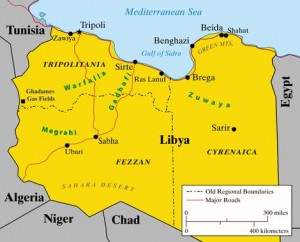Two major oil companies in Libya say they expect to restore their pre-war production levels by the end of the month, just in time to help pick up the slack for energy-hungry Europe if Persian Gulf crude supplies are cut off in the confrontation between Iran and the West.
Other firms make equally optimistic forecasts as damage to the oil industry is repaired.
But the security situation in the North African state five months after the overthrow and death of longtime dictator Moammar Gadhafi remains as precarious as it is in the gulf.
That could adversely affect oil production.
"With Iran threatening to close the Strait of Hormuz to oil shipped from the gulf, Libya's oil takes on increasing geopolitical importance," Oxford Analytica observed Tuesday.
"Security is key to production increases but oil revenue is key to achieving stability.
"While the situation in the oil fields seems to be fairly secure, in the cities it is more uncertain. Many former rebel fighters are still armed and the process of forming a national security force is moving forward slowly.
"The government is in desperate need of funds to stabilize the country and has, in its oil industry, a major potential source," the analysis noted.
"However, the country also has a major unemployment problem, with almost a quarter of the population out of work.
"Political tensions in Libya will remain until oil revenues increase, providing the funds for infrastructure projects necessary to provide employment."
Libya has oil reserves of 46.4 billion barrels, the largest in Africa.
The rebel alliance that drove Gadhafi from power in an eight-month revolution in 2011 has splintered and several militias, based on particular clans and regions, remain heavily armed.
They have repeatedly clashed with each other and the new interim government, the Western-backed National Transitional Council.
It was plunged into crisis this week when mass protests broke out in Benghazi over the close ties some NTC officials had with Gadhafi's regime.
Gadhafi loyalists have reappeared recently and fought gun battles with NTC forces. The marauding militias, vying for influence and power in the post-Gadhafi era, have become the biggest threat to security and stability as the NTC struggles to exert its authority.
The militias are scaring foreign oil companies into delaying the return of their technicians who are vital to keeping the oil industry functioning.
"We're now between two bitter options," NTC Chairman Mustafa Abdel Jalil declared in Benghazi recently. "We deal with these violations strictly … or we split and there will be a civil war."
The combination of Libya's location on the southern shore of the Mediterranean and its "sweet" oil -- light and low in sulfur content, which makes it easy to process -- has made it attractive to consumers, particularly refineries in carbon-conscious Europe.
And with Europe facing the loss of around 500,000 barrels of Iranian oil a day following the European Union's decision Monday to impose an oil embargo on Iran over its contentious nuclear program, Libyan oil is all the more attractive to EU states.
"In the light of Iran's threatening stance over the Strait of Hormuz … the relative strategic value of Libyan crude is increased, given its location outside the gulf," Oxford Analytica noted.
Tehran has threatened to close the narrow, 112-mile strait at the southern end of the gulf through which one-fifth of the world's oil supply passes daily, if the United States and the EU enforces the oil embargo.
U.S. President Barack Obama approved a campaign to choke off Iran's oil exports, which supplies some 80 percent of its state revenues, on Dec. 31.
When Gadhafi was toppled, oil production had fallen from the pre-conflict level of 1.6 million barrels per day to less than 100,000 bpd. Since then the Libyans have built that back to 1 million bpd, months earlier than expected.
(Source: UPI)





